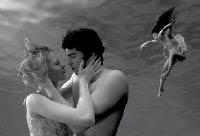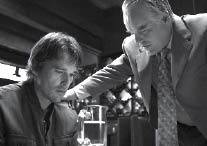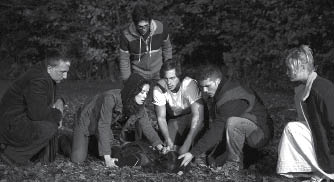More Movies Than You Can Shake a Stick At
by M. Faust

Let’s see: In the first part of my coverage of the Toronto International Film Festival I covered nine of the films I saw in about 2,500 words. With 29 left to do, I had clearly better pick up the pace.
Nearly 40 movies in nine days may sound like a lot (my festival record is 62), but it barely scratches the surface of the 275 feature films shown. I tend to avoid the movies that are going to be opening soon locally (unless I’m doing interviews for them), which helps pare the list down: I didn’t bother lining up for The Brave One, Michael Clayton, Into the Wild, The Assassination of Jesse James, The Jane Austen Book Club, Cleaner, Elizabeth: The Golden Age, Rendition, the Coen brothers’ No Country for Old Men, Woody Allen’s Cassandra’s Dream.
On the other hand, I wish I’d managed my schedule a little more carefully and made room for Juno, Le Deuxième Souffle, Claude Chabrol’s A Girl Cut in Two, Ken Loach’s It’s a Free World, Phil Donohue’s documentary Body of War, either of the two Joy Division movies, Nothing is Private, the directorial debut of Six Feet Under creator Alan Ball, and most of all the partially-filmed-in Buffalo The Savages, with Phillip Seymour Hoffman and Laura Linney.

But on to what I did see: Probably my favorite film of the Festival was I’m Not There, Todd Haynes’ exploration of the myth of Bob Dylan, using six different actors to play different stages of his public persona. Cate Blanchett is getting the lion’s share of the attention as the iconoclastic pre-motorcycle accident Dylan, though it’s less a matter of cross-gender theatrics than simple good casting. With it’s free-form structure and general disregard of the standard Dylan canon, it is a provocative film filled with poetry and charisma. Everything, in fact, that Julie Taymor’s Beatles pastiche Across the Universe so sorely lacks. It had me thinking that maybe Sgt. Pepper’s Lonely Hearts Club Band, generally considered one of the worst films of the 1970s, wasn’t quite so bad after all.
There was more music on hand in Lou Reed’s Berlin, the concert documentary of Lou recreating his 1973 masterpiece, widely overlooked at the time. It’s one of my all-time favorite albums, though nothing you’d want to listen to if you’re prone to depression. But aside from a few extended guitar solos (this is Lou Reed, after all), the film adds little to what you could get from popping the album in your CD player. Glass: A Portrait of Philip in 12 Parts is a lovingly crafted documentary by Scott Hicks (Shine) that gets across the notion that the popular composer is a swell fellow beloved by his friends and family, but does little to explore the nature and roots of his music.
Among other films that will be playing locally in the next few months, I enjoyed Margot at the Wedding, even if it seemed like more of the same from Noah Baumbach (The Squid and the Whale). It’s coming to theaters during Oscar season, so the studio must have high award hopes for co-stars Nicole Kidman and Jennifer Jason Leigh as sisters trying to resolve their perpetually rocky relationship. Also due at the end of the year is Rails and Ties, the directorial debut of Alison Eastwood (yes, his daughter). Oscar kudos seem much less likely for this well-intended but poorly plotted drama starring Kevin Bacon and Marcia Gay Hardin as a couple facing death and rebirth; suffice to say that an irresistible orphan is involved. Some of the same problems afflict Reservation Road, opening here on November 11, about the effects of a fatal hit-and-run accident on two couples, though the performances by Mark Ruffalo and Joaquin Phoenix make up for a lot of the script’s weaknesses. It’s directed by Terry George (Hotel Rwanda). But the real tear-jerker of the Festival was Richard Attenborough’s Closing the Ring, starring Shirley MacLaine as a widow haunted by the events of World War II 50 years after the fact. It doesn’t have a distributor yet, but I’m sure it will be picked up before long.

Sleuth is less a remake of the 1972 classic than a re-imagining of the original play by Anthony Shaffer, no surprise given that the screenplay this time was written by Harold Pinter. Jude Law takes the part earlier played by Michael Caine, while the Laurence Olivier role is filled by (come on, you can see this coming) Michael Caine. As directed by Kenneth Branagh, it’s a nastier affair that has divided critical opinion, and I can’t say that I’ve quite made up my mind on it. It should be in theaters in November.
Even nastier—and I say that in the best sense of the word—is another November release, Before the Devil Knows You’re Dead, which marks the 50th year in filmmaking for director Sidney Lumet. Philip Seymour Hoffman and Ethan Hawke star as brothers who, in desperate need of money for different reasons, stage the robbery of a jewelry store that goes badly awry. A fractured tale of crime and dysfunctional family, it’s Lumet at the peak of his powers. (I spoke to him at the festival for an interview that will run when the film opens here. Know who his current favorite filmmaker is? Judd Apatow.)
Aging not quite as well is George Romero, still struggling under the burden of the horror subgenre he created 40 years ago with Night of the Living Dead. After the failure of his big-budget Land of the Dead in 2005, he’s gone back to the beginning with Diary of the Dead, relaunching the story in 2007. Instead of stranding his protagonists in a house under attack by zombies, though, this time he puts them on the road, a group of college film students documenting the ongoing chaos to the world via the Internet. It’s a tactic that doesn’t really cover up the fact that Romero has run out of things to do with the genre, which may explain why the film ends on such a bitter note.

Commissioned to celebrate the 60th anniversary of the Cannes Film Festival, Chacun son Cinema (To Each His Cinema) features short films on the theme of the love of cinema as made by 34 of the world’s leading filmmakers. And when I say leading, I don’t mean that lightly: Can you go wrong with a compilation of short films by Abbas Kiarostami, Aki Kaurismäki, Alejandro González Iñárritu, Amos Gitai, Andrei Konchalovsky, Atom Egoyan, Bille August, Claude Lelouch, David Cronenberg, David Lynch, Elia Suleiman, Gus Van Sant, Hou Hsiao-Hsien, Jane Campion, Joel and Ethan Coen, Chen Kaige, Wong Kar Wai, Ken Loach, Lars von Trier, Jean-Pierre and Luc Dardenne, Manoel de Oliveira, Michael Cimino, Tsai Ming-Liang, Nanni Moretti, Olivier Assayas, Raoul Ruiz, Raymond Depardon, Roman Polanski, Takeshi Kitano, Theo Angelopoulos, Walter Salles, Wim Wenders, Zhang Yimou and Youssef Chahine? You cannot.
Geez, is that the end of the page creeping up already? I haven’t even mentioned Brian DePalma’s Redacted, which re-enacts an Iraq war atrocity with more self-conscious style than actual content; Shake Hands with the Devil, Roger Spottiswoode’s devastating adaptation of Romeo Dallaire’s autobiography detailing his experiences as head of the UN mission to Rwanda during the genocide; Encounters at the End of the World, in which Werner Herzog learns that even Antarctica has such “abominations” as yoga classes and an ATM machine (fortunately for him, things get grimmer once he gets off the base camp); Francois Ozun’s Angel, in which he tried to parody film melodrama a la Douglas Sirk only to fall into the trap of recreating the worst aspects of it; or Jonathan Demme’s documentary Jimmy Carter: Man from Plains, which I think I enjoyed but can’t clearly recall given that it was the last of the 38 films that I saw.
Oh well, 50 weeks left to rest up before next year’s festival.
|
Issue Navigation> Issue Index > v6n39: Into the Biennial (9/27/07) > More Movies Than You Can Shake a Stick At This Week's Issue • Artvoice Daily • Artvoice TV • Events Calendar • Classifieds |









 Current Issue
Current Issue